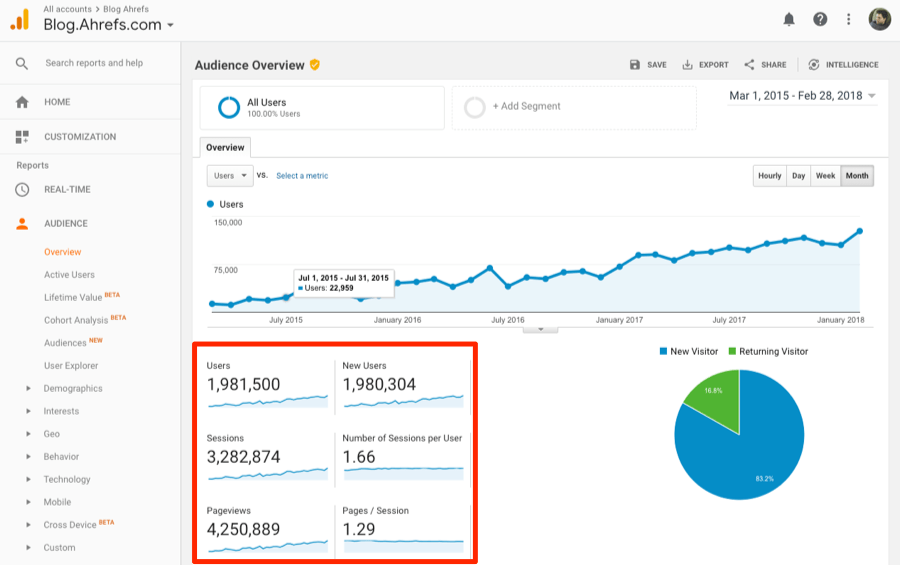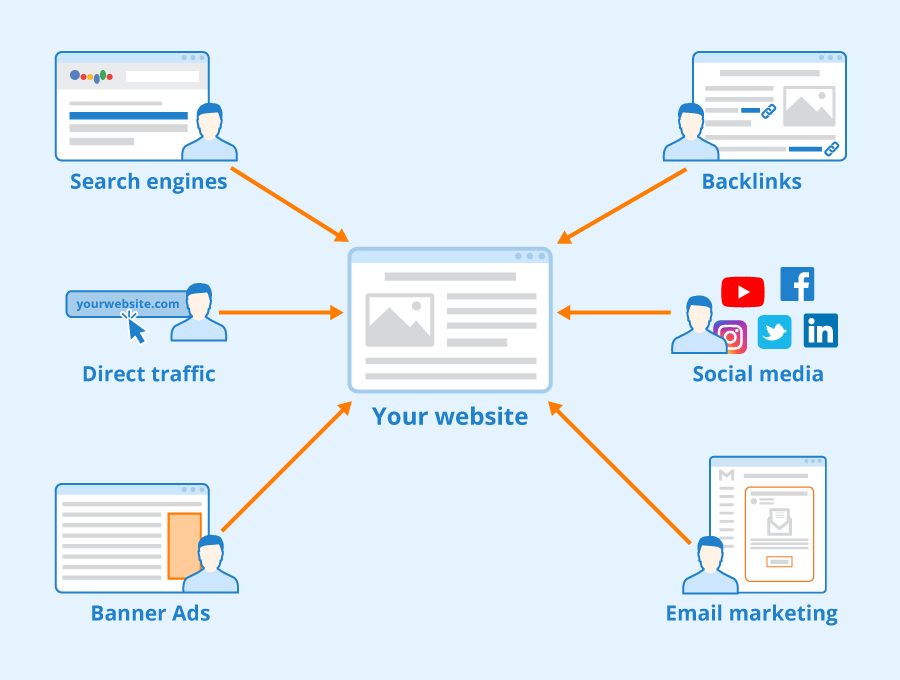Website traffic refers to the volume of users visiting a website. It depends on the website's purpose and visitors' goals.
Additionally, it is the way users discover the site. Website traffic encompasses the number of users visiting a website. This metric is crucial for assessing a website's performance and effectiveness. Understanding website traffic allows website owners to evaluate the success of their online presence and digital marketing efforts.
By measuring the volume of visitors, the sources of traffic, and the behavior of users, businesses can make informed decisions to enhance their online visibility, engagement, and conversion rates. Understanding website traffic is essential for optimizing website performance and achieving business objectives in the digital landscape. Monitoring and analyzing website traffic helps businesses adapt their strategies to attract and retain valuable online traffic.
Importance Of Website Traffic
Website traffic refers to the volume of users visiting a website. It is the measurement of people who visit a website. The number of people who visit a website depends on the website's purpose, the visitors' own goals, and how they discovered the site. When it comes to measuring website traffic, there are several key metrics that can provide important insights into the website's performance and how people use it.
One important metric is the traffic sources, which shows how visitors came to a website. This can be categorized as organic traffic from search engine results, direct traffic from typing the URL, referral traffic from other websites, traffic from social media, or traffic from paid advertisements.
There are three basic types of website traffic: organic, direct, and referral. Organic traffic comes from search engine results, direct traffic occurs when users directly type the URL into their browser or click on a bookmark, and referral traffic comes from other websites that link to the website.
In conclusion, website traffic is crucial for the success of a website. By measuring and analyzing website traffic, website owners and marketers can gain valuable insights and make informed decisions to improve their website's performance and increase its visibility to target audiences.
Types Of Website Traffic
Website traffic refers to the volume of users visiting a website. The visitors' own goals and the way in which they discovered the site determine how many people visit a website. Servers monitor website activity and register whenever a page receives a visitor (known as a 'hit'). The basic types of traffic include: organic, direct, referral, social media, paid, and email. Traffic sources may be categorized as organic (from search engine results), direct (e.g., typed the URL), referral traffic (links from other websites), social media, or via paid advertisements.
Sources Of Website Traffic
Website traffic refers to the volume of users visiting a website, and it can come from various sources such as organic, direct, referral, social media, and paid sources. Organic traffic originates from search engine results, direct traffic includes visitors who type the URL, referral traffic comes from links on other websites, and social media traffic is derived from social platforms. Paid traffic involves visitors from advertisements. Understanding the different sources of website traffic is essential for businesses to develop effective marketing strategies.

Credit: ahrefs.com
Analyzing Website Traffic
Website traffic refers to the number of visitors a website receives. It depends on the site's purpose and how users find it. Servers record each visit as a 'hit,' monitoring user activity on the site.
| Key Metrics for Website Traffic Analysis: | Tools for Checking Website Traffic: |
|
- Session Numbers: This metric measures how many website visitors are active within a specific time period. It helps understand user engagement and the popularity of the website. - Traffic Sources: This metric reveals how visitors found the website. It categorizes traffic into organic (from search engines), direct (typed URL), referral (from other websites), social media, and paid sources. - Bounce Rate: This metric indicates the percentage of visitors who leave the website after viewing only one page. It helps assess website content and user experience. - Conversion Rate: This metric measures the percentage of website visitors who complete a desired action, such as making a purchase or filling out a form. - Average Time on Page: This metric shows the average duration visitors spend on a specific page of the website. It helps gauge user interest and the effectiveness of content. - Exit Rate: This metric determines the percentage of visitors who exit the website from a specific page. It provides insights into pages that may require improvement. |
There are various tools available to check website traffic, including: - Google Analytics: This free tool provides comprehensive insights into website traffic, user behavior, and conversion tracking. - SEMrush: Alongside keyword research and SEO analysis, SEMrush offers website traffic analysis, competitive intelligence, and backlink tracking. - SimilarWeb: This tool provides data on website traffic, audience demographics, and competitor analysis, helping identify trends and benchmark performance. - Alexa: With its global traffic rank, Alexa offers valuable metrics to analyze website traffic, including audience geography, engagement, and bounce rate. - Ahrefs: Primarily an SEO tool, Ahrefs also offers website traffic analysis, backlink data, and competitor research for informed decision-making. |
Strategies To Increase Website Traffic
Website traffic refers to the volume of users visiting a website. It depends on the website's purpose, visitors' goals, and how they discovered the site. Monitoring website activity helps measure the number of visitors and their interactions with the pages.
| Search Engine Optimization (SEO) | Optimizing website content for search engines boosts visibility and organic traffic. |
| Content Marketing | Creating valuable and relevant content attracts users and drives traffic to the site. |
| Social Media Engagement | Active presence on social platforms encourages user interaction and website visits. |
| Paid Advertising | Strategic ad campaigns can target specific audiences and increase website traffic. |
| Email Marketing | Sending targeted emails to subscribers can drive traffic and conversions. |

Credit: matomo.org

Credit: www.seobility.net
Frequently Asked Questions Of What Is Website Traffic
What Is The Meaning Of Website Traffic?
Website traffic refers to the number of users visiting a website. It depends on the site's purpose, visitors' goals, and how they discovered the site. Servers monitor the activity, registering each visit as a 'hit. ' It's crucial for measuring a website's performance.
What Is An Example Of Website Traffic?
Website traffic includes users visiting a website. For instance, when Alice visits her hair salon's website to book an appointment, she contributes to the site's traffic. This can come from various sources such as search engines, direct URL entries, referrals, social media, or paid ads.
What Does Website Traffic Include?
Website traffic includes the number of users visiting a website. It can come from various sources such as search engines, direct visits, referrals from other websites, social media, or paid advertisements. Monitoring website activity helps measure the volume of visitors and their interactions with the site.
What Are The Three Types Of Website Traffic?
The three types of website traffic are organic, direct, and referral. Each type signifies different sources of visitor traffic to a website.
Conclusion
Website traffic refers to the volume of users visiting a website. It is an important metric in digital marketing, as it indicates how well a website performs and how people use it. The number of visitors to a website depends on the website's purpose and the marketing efforts put into it.
By monitoring website activity, businesses can gain insights into their audience and make informed decisions to drive more traffic. Understanding and effectively managing website traffic is crucial for the success of any online venture.
